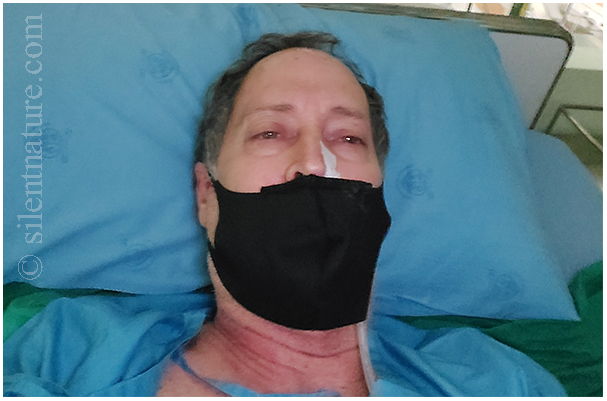 |
 |
| The Lockdowns Sent Me to Emergency (Page 1 of 3) |
|
Having a painful hernia, two years ago I scheduled
surgery at one of the hospitals here in Bangkok. But with the Covid lockdowns,
the Thai government deemed my surgery "non-essential" and canceled the
operation. Altogether, I would schedule the surgery 4 times, and 4 times the
Thai government would deem it "non-essential" and cancel my appointment. I can understand that
plastic surgery is a "non-essential" service provided by the hospital. But who,
in their infinite wisdom, decided that fixing a painful hernia, that puts serious
restrictions on what I can do, and that can at any moment evolve into an
emergency, was non-essential? My hernia was so big that it had
fallen all the way down into my scrotum, making my scrotum look five times as
big as normal. Any time it was out too long, the pain would become unbearable,
so throughout the day I was constantly,working my hernia back into its proper
place. But sometimes it became so bloated and so hard, that it could not be
tucked back in. When that happened there was nothing else I could do but lie on
my bed in pain and wait until it became softer and more pliable. One night I lied awake all night, as it took 13 hours for me to get
my hernia back in. Then came Friday the 19th of February. For 24 hours I waited, but my hernia remained hard and stubborn. I thought I should go to the hospital, but it was 9 p.m. on a Saturday night, and I wasn't sure there would still be a good hernia doctor present at that hour. I had hoped that the doctor might have some trick up his sleeve for getting my hernia back into my stomach. I did not want an unscheduled surgery because my U.S. Medicare health insurance would not cover any proceedures here in Thailand. I had already talked to five hospitals here in Bangkok, and the normal proceedure itself would break my bank. You might say that doing a surgery under emergency conditions would place me on the Bangkok bridges for the rest of my life, desperately begging for money. I waited an additional 12 hours until Sunday morning, hoping that in the extra time perhaps some gases would pass out of my herniated area and I would be able to push it back in myself. The next day when I arrived at the hospital I found that the doctor had no special tricks nor proceedures. He said that the only way he could get my hernia back in was to cut me open. When I explained to him that I had no insurance, he suggested that this was an expensive hospital. He recommended another hospital where he said it would cost one tenth as much money to do the exact same thing that he would do. It was only about a 10 minute taxi ride away. I spent about an hour on a gurney waiting in a hallway, only to be moved to another location where I waited yet another hour. The doctor was concerned that my intestine might be strangulated, and if the circulation had been cut off long enough the instestine would die and would need to be surgically removed. For the rest of my life I might have to live without a portion of my intestines. I went under the effects of anesthesia and don't remember anything about the surgery, but afterwards, as I was being wheeled down the hallway toward the large room I would spend the next 5 days in, I was told to wake up. The good news was that my small intestine was okay and that it had not been removed. That also meant that my hernia had been repaired and there would not be a second surgery. I was assigned a bed that arranged itself with 9 others into 2 rows of five. That first night was the longest and most boring night of my life. We had a T.V. but it was only on 2 hours a day, the screen was bad, and it only played terrible Thai love dramas along with the Channel 3 news (where every video clip was sure to be played three consecutive times.) I had no laptop, no Wi-Fi, and with an unknown number of days to go, my phone battery was already down to 42%. Worst of all, I was in pain. The best way to escape the pain was to sleep, but all night long, every 5 minutes the staff woke me up, either because they would turn a light on, or make some loud noise, such as banging some pans, or talking back and forth across the room. The doctor was coming to see me in the morning and I had some questions I wanted to ask him. I found myself staring at the walls and watching the clock, but every time I looked, it had barely moved. At 3 a.m. the staff began taking tubs of water to the beds of the patients. I asked why they were giving baths at 3. a.m. and the reply was that they were giving the baths at 5 a.m. Differences in culture may explain part of what seemed to be total disregard for the patients' ability to sleep. Thais, from the time of birth, are accustomed to sleeping in noise. I have seen Thais sleep everywhere in every kind of condition, even three in a row standing on the bus, one behind the other, all three holding on to the same overhead grip with their right hand while they slept with their heads resting on their right bicep. So perhaps the staff was noisy because typically the noise doesn't wake anyone up. But why would you wake everyone to give out wash basins at 3 a.m., wait until 5 a.m., and then wake them again to give them their baths? Shouldn't patients be sleeping at 3 a.m. in the morning so that they can recuperate from their surgeries and get stronger? (next page) |